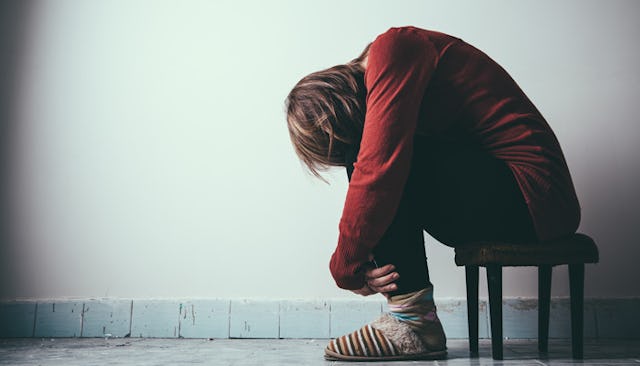7 Things About Grief I Learned The Hard Way

I have a confession to make. I cried yesterday. On my floor. In my pajamas. Computer in front of me, Netflix on, and for two hours, on and off, I sobbed my way through a movie. An Adam Sandler movie. I’m not sure if this is a new high or a new low (possibly very low).
The day before, the (stupid) 27th, marked nine months since my little boy died. The first six 27ths to come and go after Charlie’s death weren’t too bad. Another date on the calendar. Another moment. It was then that the socially acceptable time for me to grieve would have been. And yet, that’s not always how it works. Because sometimes, it’s months 6, 7, 8 and 9 that are hard. And likely 10, 11, 12 and 13 will be too. Because sometimes, on month 9, you find yourself crying on the floor with Adam Sandler.
And sometimes, you find yourself grieving, and it’s not just one loss. It’s compounded loss. All smashing into each other, one on top of the other. Divorce. Death. Abuse. Disappointment. Disillusionment. Losses come in all kinds, and grief follows them all, in big ways and small.
Over the past nine months, I’ve experienced several losses, all paling in comparison to the loss of my son. Grief has been no stranger—it’s very much an intrusive and unwelcome guest, but nevertheless, it’s one that will be here for a while.
Here’s what I’ve learned about grief:
1. Grief has no concept of time.
The things that I think will be hard, aren’t, and the things I don’t expect, hit me square between the eyes. And sometimes, it’s all a little hard, and you just limp along. The firsts are hard. And so are the seconds. And the thirds, and some day it will become normal for you to find yourself laughing on the floor, tears and snot running down your face as you go through new rounds of grief and brokenness. On those days, embrace it.
2. Grief will make you awkward.
What do you say? What do you do? How do you meet new people? What do you say when people ask personal questions? What do you do, again? How do you not cry in front of total strangers? How? Why? What? Oh, crap. Did I really just say that?
These are all questions I ask myself, and for all of these, I have no answers.
3. Grief will steal your filter.
You might probably become brutally honest, and lose all patience for petty issues or small talk. All normal. You also might become a fan of dark humor (which, of course, is widely socially unacceptable). Who makes jokes that are super morbid without blinking an eye? Serial killers and people who are grieving.
4. Grief will steal your energy.
All this zeal you have to embrace life and soak in every moment? Your heart will feel that, but sometimes your body will say nope. Some days, lying in bed all day, eating a gallon of ice cream with a spoon, and watching movies looks so much more attractive than savoring every moment. The good news? You’re allowed those days.
5. Grief has no rules.
Grief doesn’t care about you. Grief does what grief wants, and sometimes that involves very public meltdowns, or inappropriate remarks, or highly embarrassing moments. Sometimes it zaps all you have within you, and sometimes it motivates you to carry out brave and beautiful legacies. And some weeks, days or hours, it’s a little of all of that. It can also all look different for different people.
6. Grief is just a part of you, not all of you.
Loss happens. It’s devastating, and sometimes you lose someone or something that can never, ever, ever be replaced. Sometimes it feels more like an amputation. Grief comes in full force, but it’s still only a part of you. It doesn’t steal your identity. It doesn’t steal you. It sits on you like a fog, and it may change you in many ways, but beneath the grief, you’re still you—changed, but still you.
7. Grief makes you feel isolated, but really, you are never grieving alone.
The big thing that I needed to know is this: So many have gone before me, so many are beside me, and so many will come after me. I will never be alone. I’ll never be alone in the horrible pain and loss, and I’ll never be alone in the surviving. If others could survive, I can survive. If others could stay sane, I can stay sane. If others could still hope and laugh and love and live fully, then you better believe I will too.
And if someone can sob through an Adam Sandler movie, hey, you can too.
This article was originally published on